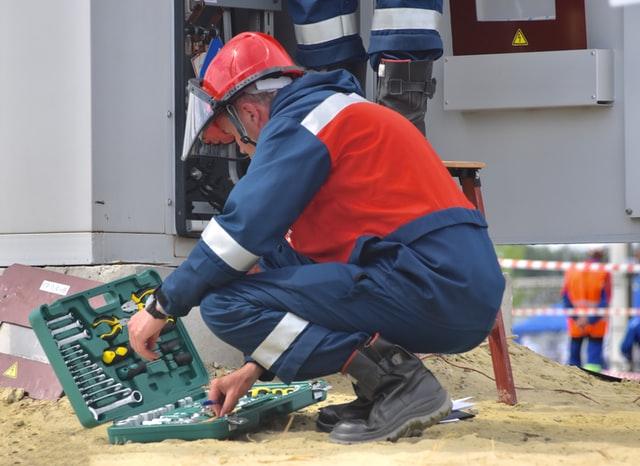Main Responsibilities and Required Skills for a Gas Technician

A Gas Technician is a professional who specializes in the installation, maintenance, and repair of gas systems, ensuring the safe and efficient supply of gas to homes, businesses, and industrial facilities. They play a critical role in maintaining the integrity of gas systems to prevent hazards and ensure a reliable supply of gas for various purposes. In this blog post, we describe the primary responsibilities and the most in-demand hard and soft skills for Gas Technicians.
Get market insights and compare skills for other jobs here.
Main Responsibilities of a Gas Technician
The following list describes the typical responsibilities of a Gas Technician:
Adjust
Adjust valves and regulators as needed.
Advise
Advise clients regarding standards, safety features and maintenance of gas units and systems.
Apply
Apply close mental and visual attention to work involving tight tolerances.
Apply testing and replacements for utility equipment only.
Assist in
Assist in the design of gas systems.
Assist management with contractor activities related to LFG and support systems.
Attend
Attend regular training and maintain working knowledge of latest industry developments.
Audit
Audit gas systems for safety and compliance.
Calibrate
Calibrate gas appliances for optimal performance.
Communicate with
Communicate well with colleagues and Customers.
Complete
Complete service or installation records accurately, completely, and on time.
Complete work within expected periods of time.
Conduct
Conduct pressure and leak tests to ensure system integrity.
Conduct safety checks on gas systems and appliances.
Connect
Connect gas appliances to the supply system.
Convert
Convert gas appliances for different gas types.
Coordinate
Coordinate monitoring data with on-site activity and updating local and regional management teams.
Deliver
Deliver exceptional customer service.
Detect
Detect and repair gas leaks promptly.
Diagnose
Diagnose and repair automatic transmission and transfer case.
Diagnose and repair hydraulic and air brake.
Diagnose and repair manual transmission.
Diagnose and repair open and short in wiring.
Diagnose and repair starting and charging systems.
Diagnose and repair suspension and steering.Diagnose and repair drive line components.
Diagnose, repair, and maintain a wide variety of commercial kitchen appliances.
Educate
Educate customers on gas safety and usage.
Ensure
Ensure systems comply with safety regulations.
Ensure systems meet environmental regulations.
Ensure that the system is operating properly before leaving site.
Estimate
Estimate costs and materials.
Estimate time and materials for field servicing and identifies other preventive work while on site.
Follow
Follow all applicable codes and guidelines.
Follow company policies and procedures as required.
Follow health and safety policies.
Generate
Generate accurate records of performed work, materials, and time.
Identify
Identify and repair gas leaks and damaged lines.
Identify and resolve system malfunctions.
Ignite
Ignite and adjust pilot lights on gas appliances.
Implement
Implement and manage the GCCS preventative maintenance plan.
Inspect
Inspect and maintain gas appliances.
Install
Install and maintain meters and regulators and gas lines between gas unit and gas meter.
Install and Service Gas Fireplaces / bbq.
Install gas lines and components in residential and commercial properties.
Install gas piping and venting of gas fired appliances.
Install, maintain and service gas heating units and their components.
Insulate
Insulate gas lines for energy efficiency.
Keep
Keep accurate records of work preformed.
Maintain
Maintain accurate records of service and maintenance.
Maintain a clean and safe work vehicle.
Maintain and calibrate tools and equipment.
Maintain and provide your own hand tools.
Maintain proper inventory and ensure regular maintenance of supplied vehicle.
Maintain service truck appearance and orderliness and carries appropriate tools and stock.
Manage
Manage the onsite Gas Technicians and Laborers.
Measure
Measure and mark reference points for installation of gas lines and equipment.
Perform
Perform emergency shutdowns when necessary.
Perform installation, maintenance, troubleshooting and repair work requiring HVAC trades knowledge.
Perform maintenance and repairs of landfill gas collection system equipment and control systems.
Perform other work as assigned by Management.
Perform routine maintenance on gas systems.
Plan
Plan and install gas line routes.
Preform
Preform engine diagnostic, tune up and repair.
Preform general maintenance and inspection.
Provide
Provide excellent customer service and address inquiries.
Provide support to management in GCCS design and construction.
Read
Read and record gas consumption data.
Read and understand drawings.
Regulate
Regulate gas pressure for safety and efficiency.
Repair
Repair and service gas appliances and related equipment.
Respond to
Respond to gas-related emergencies promptly.
Stay updated on
Stay updated on gas technology and safety practices.
Study
Study drawings and specifications to determine the layout of the installation and materials required.
Test
Test and replace defective equipment or components.
Test and verify the quality of supplied gas.
Thread
Thread, cut and assemble steel gas piping.
Understand
Understand and follows system & equipment operating manuals.
Upgrade
Upgrade gas systems for improved efficiency.
Work
Work at customer's site in a professional manner.
Work safely avoiding lost time injuries.
Most In-demand Hard Skills
The following list describes the most required technical skills of a Gas Technician:
Gas System Installation and Repair
Gas Safety Regulations and Compliance
Pressure Testing and Leak Detection
Gas Appliance Maintenance and Repair
Gas System Troubleshooting
Gas Meter Reading and Data Analysis
Gas Appliance Calibration
Tools and Equipment Operation
Emergency Response Procedures
Gas System Design and Routing
Regulator and Valve Adjustment
Documentation and Record-Keeping
Environmental Compliance
Safety Inspections and Auditing
Customer Service and Communication
Gas Quality Testing
Emergency Shutdown Protocols
Gas Conversion and System Upgrades
Tool and Equipment Maintenance
Continuous Training in Gas Technology
Most In-demand Soft Skills
The following list describes the most required soft skills of a Gas Technician:
Attention to Detail
Problem-Solving
Critical Thinking
Communication and Interpersonal Skills
Customer Service and Patience
Adaptability and Flexibility
Time Management
Emergency Response Composure
Team Collaboration
Ethical and Professional Conduct
Conclusion
Gas Technicians are essential in maintaining safe and reliable gas systems for homes and businesses. By mastering the hard and soft skills outlined in this post, they can ensure the efficient delivery of gas while prioritizing safety and environmental compliance.

